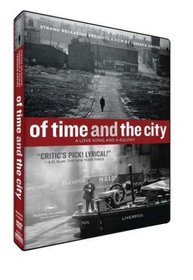| Actor: Terence Davies Director: Terence Davies Genres: Drama, Educational Sub-Genres: Drama, Educational Studio: Strand Releasing Format: DVD - Black and White,Color,Widescreen DVD Release Date: 05/12/2009 Original Release Date: 01/01/2009 Theatrical Release Date: 01/01/2009 Release Year: 2009 Run Time: 1hr 14min Screens: Black and White,Color,Widescreen Number of Discs: 1 SwapaDVD Credits: 1 Total Copies: 0 Members Wishing: 2 MPAA Rating: NR (Not Rated) Languages: English |
Search - Of Time and The City on DVD
  | Of Time and The City Actor: Terence Davies Director: Terence Davies Genres: Drama, Educational NR 2009 1hr 14min From the original voice of British auteur Terence Davies comes a visual poem about the director's life in Liverpool from 1945 to 1973. It is a very personal portrait of Liverpool, beyond its Beatles and its football clubs,... more » |
Larger Image |
Movie DetailsSimilar Movies
|
Movie ReviewsA Eulogy and a Love Song Amos Lassen | Little Rock, Arkansas | 02/27/2009 (5 out of 5 stars) ""Of Time and the City" A Eulogy and a Love Song Amos Lassen "Of Time and the City" is director Terence Davies's love song and eulogy to Liverpool, England, his birthplace. But it is also more than that; it is his response to the memory, reflection and experience of losing his sense of place as things change and time marches on. This is a personal film as Davies goes back to his youth and he remembers what Liverpool was like after World War II. Davies was raised in working class Liverpool and suffered from guilt about his homosexuality. In the film, Davies satirizes Liverpool in its aspirations of being what it isn't and shows us how vulgar he feels the architecture is. He gives us Britain of the 1950's with kids playing outside and trips to the seashore. We see footage of run down houses and of the Korean War but overall this is a look at failed urban development set to music and undeniably sentimental. Life, loss and Liverpool are the focus of this poetic documentary. The film is a bit difficult to describe but it is beautiful to watch. It is an essay put on film which is a look at memory. Almost 80% of the film comes from archival sources and Davies has labored to pick out the most effective of these. His eye is exceptional and his ear mixes sound to the shots we see. Davies very obviously loves Liverpool and misses the Liverpool that was. He also is angry about what went on in his life there. He openly gives us his resentments and his anger. He tells us his rage over being raised Catholic and of organized religion. He doesn't like the monarchy either. He speaks openly about the treatment of gays and the laws against them in England. However, upon else, the film shows how Liverpool molded him and we see how lucky we are to have him. " Mersey beats Russell E. Scott | Austin, TX | 05/20/2009 (5 out of 5 stars) "Davies has laid bare the rotted fruit of the industrial revolution and missteps of modern man on a mission with blinders. One may never see a city so lovely, so romantically enveloped from a boyhood naivety to an old man cynicism. Liverpool was the working man's "Rule Britannia" port-o-call. The world began and ended with the soot filled skies, industrial waterfront, and battle cries of good natured regional footballers. The hardships of coming home to that place you couldn't wait to escape, but then realize you've always wanted to be nowhere but here. A love letter to the heart. A poetic bullet from a forgotten past to some obscure, impotent future, this film is a marvel. Using the current British monarchy as "the Betty Windsor show" to take the piss out of an ineffective and 'long pampered to no good end' we see the riches lavished on royalty while the distraught portend and fein happiness with a wink and nod. Blessed abundance of wit, charm, and razor thoughts, "the problem with being poor is it takes up all your time. The problem with being rich is it takes up everybody else's". Yes, this is a fools paradise but it's his. The visual panorama reveals hidden cameras long ago planted and left to run unencumbered. The amount of material is boggling and starts to numb when he takes another robust verbal joust at the things he loves to hate, and the things he hates to love. Intimacy into and family of poverty run amok. Nothing will ever be the same. When you come home, the one change, the biggest one is yourself. Again you are reminded he's not heavy, he's your brother. And nothing is more catholic than the pope. Blessed be the meek for they have inherited Liverpool and forever shall it remain an imitation of some past." A marvellous documentary bucky | london | 07/04/2009 (5 out of 5 stars) "A beautifully made film,fanatstic use of black and white footage and a poetic commentary. Pure film making by a devotee of film." Great imagery, lousy narration Mark Vlosky | Broomfield, Colorado USA | 04/06/2010 (2 out of 5 stars) "The idea for this movie, comparing imagery from different eras of an industrial city, was engaging, as were the movie shots all the way through. The narrator however was a self-obsessed blowhard with a booming, breathless voice, completely ruining the effect. I was able to watch most of it with my TV muted, but of course not really enjoy it. The music, when I dared listen, was good."
|


